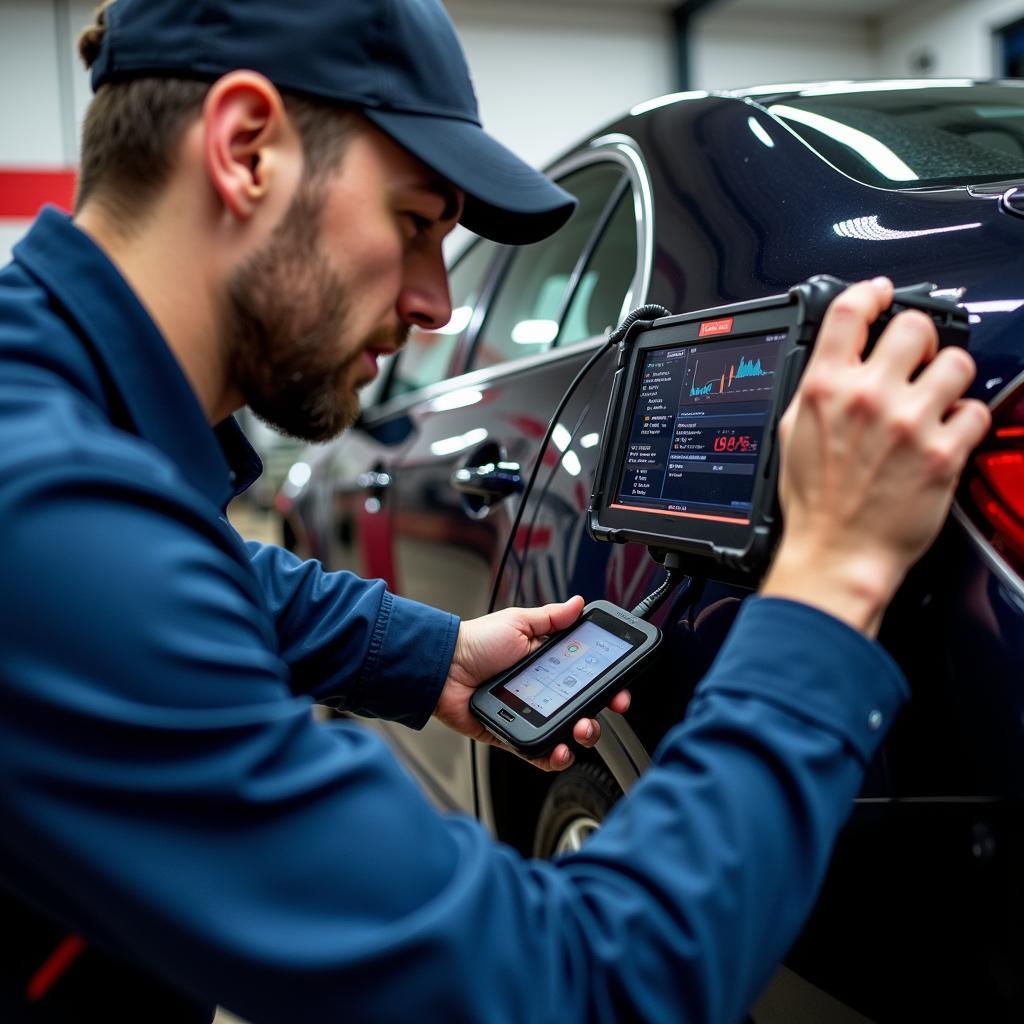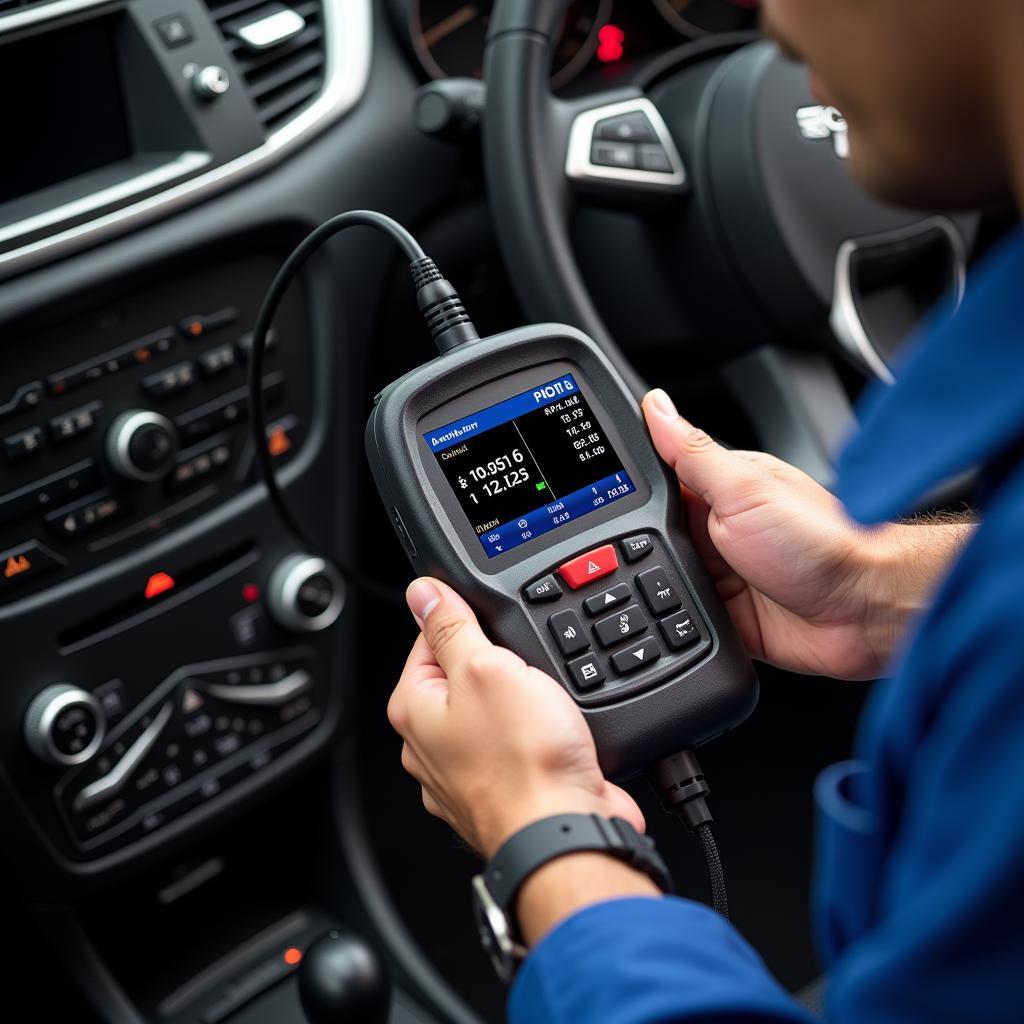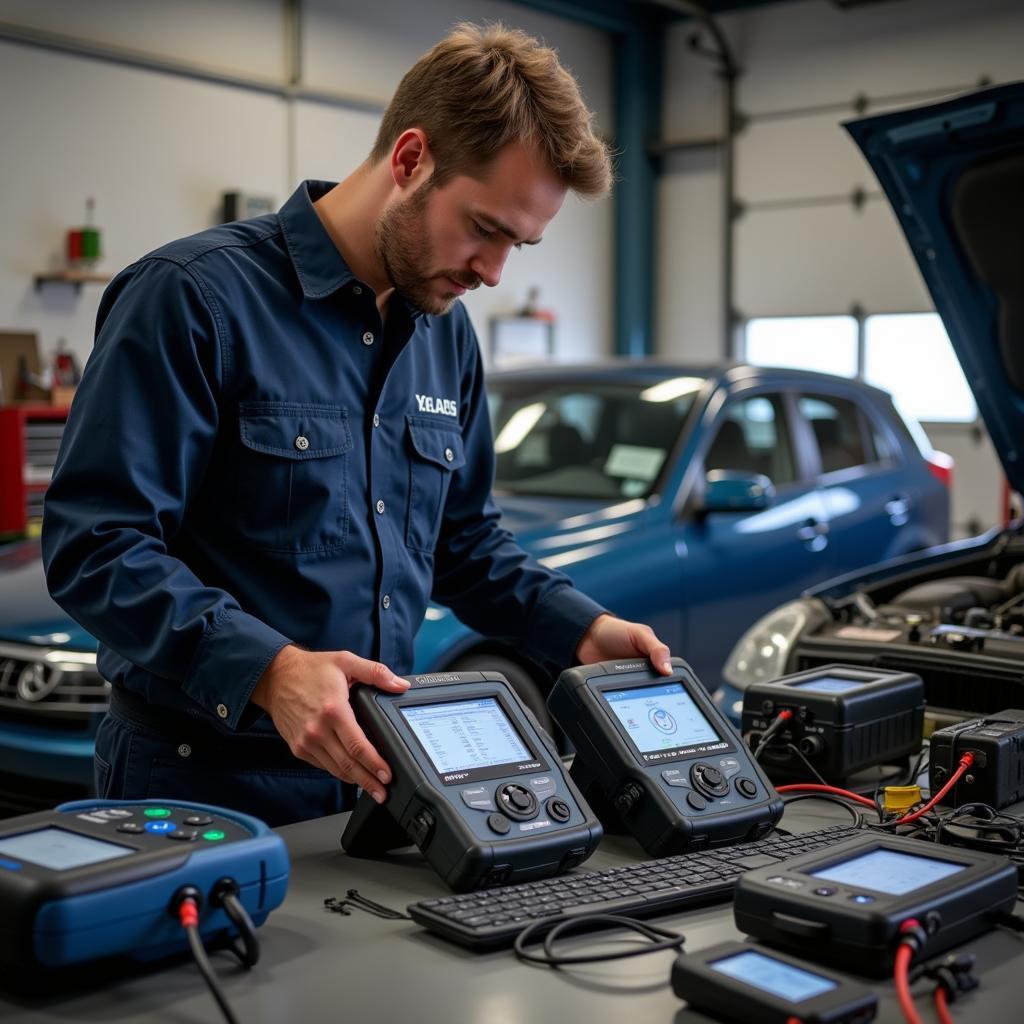Choosing the right Professional Car Diagnostic Machine can be a game-changer for mechanics, technicians, and garage owners. With the ever-increasing complexity of modern vehicles, gone are the days of relying solely on experience and intuition to diagnose car problems. A high-quality diagnostic machine is no longer just a luxury but a necessity for any serious automotive professional. This comprehensive guide will delve deep into the world of professional car diagnostic machines, providing you with everything you need to know to make an informed decision for your specific needs.
Why Invest in a Professional Car Diagnostic Machine?
Investing in a professional car diagnostic machine offers a multitude of benefits, directly impacting your efficiency, accuracy, and ultimately, your bottom line. Here’s why it’s a smart move for your automotive business:
- Enhanced Accuracy and Speed: Say goodbye to the days of time-consuming guesswork. Professional diagnostic machines can quickly and accurately pinpoint issues within a vehicle’s systems, allowing you to provide faster and more effective repairs.
- Increased Efficiency and Productivity: By streamlining the diagnostic process, you can significantly reduce the time spent on each vehicle, allowing you to service more clients and boost your overall productivity.
- Cost Savings: While the initial investment might seem daunting, a professional car diagnostic machine can save you significant money in the long run by avoiding misdiagnoses and unnecessary part replacements.
- Customer Satisfaction: Providing fast, accurate, and reliable diagnostics translates to happier customers. This enhanced customer satisfaction can lead to increased loyalty and positive word-of-mouth referrals.
- Staying Ahead of the Curve: As vehicles become increasingly sophisticated, a professional diagnostic machine ensures you stay equipped to handle the complexities of modern car technology.
 Mechanic Using a Professional Car Diagnostic Machine
Mechanic Using a Professional Car Diagnostic Machine
Types of Professional Car Diagnostic Machines
Navigating the diverse world of professional car diagnostic machines requires understanding the different types available. Each caters to specific needs and budgets. Here’s a breakdown:
1. OBD-II Code Readers
OBD-II (On-Board Diagnostics) code readers are the most basic type of diagnostic tool. They can read and clear basic diagnostic trouble codes (DTCs) stored in a vehicle’s computer, giving you a starting point for diagnosing problems. These are generally more affordable and suitable for DIYers or those starting in the automotive field.
2. Handheld Scan Tools
A step up from basic code readers, handheld scan tools offer more advanced functionalities. They can read live data streams from various vehicle systems, perform actuator tests, and access manufacturer-specific codes, providing a more in-depth diagnosis. Handheld scanners are portable and versatile, making them ideal for busy workshops or mobile mechanics.
 Mechanic Performing Diagnostics with Handheld Scanner
Mechanic Performing Diagnostics with Handheld Scanner
3. PC-Based Scan Tools
For the most comprehensive diagnostics and advanced features, PC-based scan tools are the go-to option. These tools connect to a laptop or PC, providing a larger screen, more processing power, and access to extensive software suites. This setup allows for in-depth analysis, graphing, and data logging, making them suitable for specialized workshops or dealerships.
4. OEM (Original Equipment Manufacturer) Scan Tools
OEM scan tools are specifically designed for use with vehicles from a particular manufacturer. They offer the most comprehensive coverage for that brand, including access to proprietary systems and data not available on generic tools. OEM tools are ideal for dealerships or workshops specializing in a specific car brand.
Choosing the Right Professional Car Diagnostic Machine
Selecting the appropriate professional car diagnostic machine for your needs involves considering several crucial factors. Carefully evaluating these aspects will ensure you invest in a tool that aligns perfectly with your requirements and budget.
- Your Budget: Diagnostic machines range from affordable to high-end. Determine a realistic budget and explore options within that range.
- Vehicle Coverage: Consider the makes and models of vehicles you typically work on. Some machines specialize in certain manufacturers, while others offer broader coverage.
- Required Features: Identify the specific features you need, such as live data streaming, bi-directional controls, special functions, or coding capabilities.
- Software and Updates: Ensure the machine’s software is user-friendly and regularly updated to support the latest vehicle models and technologies.
- Technical Support and Warranty: Opt for a reputable brand that offers reliable technical support and a comprehensive warranty for peace of mind.
 Mechanic Comparing Different Car Diagnostic Machines
Mechanic Comparing Different Car Diagnostic Machines
Key Features to Look for in a Professional Car Diagnostic Machine
When choosing a professional car diagnostic machine, understanding the key features that impact its functionality and effectiveness is crucial. Pay close attention to these features to ensure you’re getting the most out of your investment:
- Code Reading and Clearing: The ability to read and clear DTCs from all available vehicle systems, including engine, transmission, ABS, airbags, and more.
- Live Data Streaming: View real-time data from various sensors and components, essential for monitoring system performance and identifying intermittent problems.
- Actuator Tests: The capability to activate components like solenoids, relays, and injectors to verify their functionality and diagnose issues.
- Special Functions: Access to manufacturer-specific functions such as key programming, module coding, and reset procedures.
- Data Logging and Playback: Record and review data streams, allowing you to analyze driving patterns, diagnose intermittent problems, and provide evidence to customers.
Maximizing Your Investment: Tips for Using Your Car Diagnostic Machine Effectively
Once you’ve invested in a professional car diagnostic machine, it’s essential to maximize its potential by using it effectively. Here are some tips to get the most out of your diagnostic tool:
- Invest in Training: Consider enrolling in training courses or workshops to enhance your understanding of the machine’s capabilities and learn advanced diagnostic techniques.
- Stay Updated: Regularly update the machine’s software to access the latest features, vehicle coverage, and bug fixes.
- Develop a Systematic Approach: Establish a consistent process for connecting, scanning, and analyzing data to ensure accurate and efficient diagnostics.
- Consult Online Resources: Utilize online forums, technical databases, and manufacturer websites to gather information, troubleshooting tips, and diagnostic guidance.
- Record and Analyze Data: Develop a habit of logging data and reviewing it to identify patterns, intermittent issues, and long-term trends.
Conclusion
In the fast-paced world of automotive repair, a professional car diagnostic machine is no longer optional; it’s a vital tool for success. By investing in the right machine and maximizing its potential, you can enhance your diagnostic capabilities, improve efficiency, and provide top-notch service to your customers. Remember to consider your specific needs, explore the available options, and prioritize features that align with your business goals. With the right tool and knowledge, you can confidently diagnose and repair even the most complex car problems.
FAQs
What is the difference between an OBD-II code reader and a professional car diagnostic machine?
An OBD-II code reader is a basic tool that reads and clears basic trouble codes. A professional car diagnostic machine offers more advanced features such as live data streaming, actuator tests, and special functions.
Can I use a professional car diagnostic machine on any vehicle?
Most professional car diagnostic machines offer wide vehicle coverage, but some specialize in specific manufacturers. It’s essential to check the machine’s compatibility before purchasing.
Do I need to be a certified mechanic to use a professional car diagnostic machine?
While certification isn’t always required, a strong understanding of automotive systems and diagnostic procedures is crucial for using a professional car diagnostic machine effectively.
How often should I update my car diagnostic machine’s software?
It’s recommended to update your car diagnostic machine’s software regularly, ideally whenever a new update is released by the manufacturer. This ensures you have access to the latest features, vehicle coverage, and bug fixes.
What kind of technical support can I expect from car diagnostic machine manufacturers?
Reputable manufacturers offer various technical support options, including phone support, email assistance, online forums, and FAQs. It’s essential to choose a manufacturer that provides reliable and responsive technical support.
For any assistance with choosing the right car diagnostic tool for your needs, feel free to reach out to us. Our team of experts is available 24/7 to answer your questions and guide you toward the perfect solution. You can contact us via WhatsApp: +1(641)206-8880, or Email: [email protected]. We are committed to helping you elevate your automotive diagnostic capabilities.

Leave a Reply